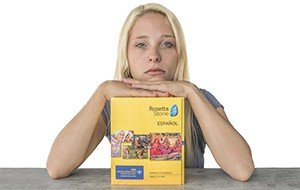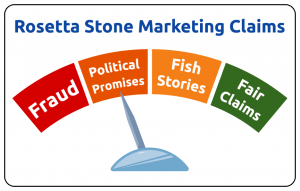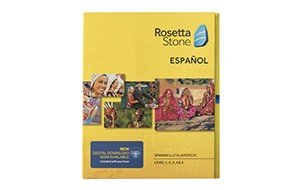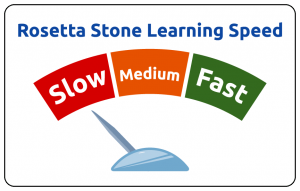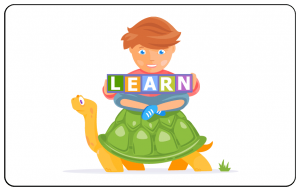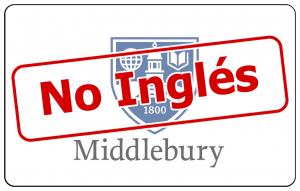Rosetta Stone: 2024 – Why You Won’t Learn Much
Rosetta Stone is a well-known company in foreign language learning. So maybe you are wondering how well it has worked for others and if it would work well for you.
Summary of This Review:
You probably won’t learn much with Rosetta Stone. That’s because a big portion of the program teaches you separate words without their context—and without context, words don’t have meaning.
To understand why this is true, imagine being a foreigner trying to learn English. If you learn just two phrases, “What’s your name?” and “My name is …” and you know how to use them, then you know a little bit of English. You know two useful things!
But if you learned all six words separately and what each of them meant but didn’t know how to put them together and use them, then you don’t know any English.
Without context, words are just funny sounds.
What the Rosetta Stone Learners I’ve Met Couldn’t Do
I’ve traveled the world and talked with thousands of language learners.
Every time I met someone who had learned a new language, I asked them how they learned it. When I found people who were trying to learn Spanish, French, German, or some other language with Rosetta Stone, they never could say more than a few words of their new language. They couldn’t even ask a useful question like “What’s your name?”
So if you’re wondering, “Does Rosetta Stone work?” my answer is, “For everyone I’ve met (and I’ve met hundreds, perhaps thousands of language learners), Rosetta Stone does not work.”
I wish that weren’t true, because the people who work at Rosetta Stone are a talented bunch. Hopefully they will eventually develop language-learning programs that really work.
What Works Better Than Rosetta Stone?
Unfortunately the language learning business is a lot like the gym business. People buy gym memberships and then they don’t go, just like they buy Spanish learning programs, but then they never study with them.
To learn a language successfully, you need to find a plan that solves the difficult human behavior problems of staying motivated, doing your study time and sticking to a learning plan that is known to work well.
Fortunately a plan like that does exist, which is why I recommend that you take a few minutes to:
You should watch this even if you want to learn a different language than Spanish as only the amount of study time required changes.
If you are just looking for better software solution, that will help you learn more for every hour of study time than Rosetta Stone, click on one of the four flags below this or the eight flags at the bottom of the page.
The detailed Rosetta Stone review starts below.
You Can’t Learn Like a Child—Unless You Are One
Rosetta Stone used to claim that you could learn a foreign language the same way a child does if you just bought their program. The company faced a lot of well-deserved criticism for this claim. So eventually they changed their ads—just a little.
Next they said, that if you used their program, you would be “learning a new language the way you learned your first.” It was the same claim, and it was still wrong.
As I write this, they are advertising that they have “bite sized lesson” which is probably honest enough and an “immersive environment for long-lasting learning” with is more marketing nonsense as it only means that their program is available on your computer screen, not on any virtual reality headset.
Your Brain Is Different Than a Baby’s Brain
To understand why Rosetta Stone’s claim is 100-percent wrong, and not simply an advertising exaggeration, you need to know the difference between the brain of an adult and the brain of a newborn baby.
From the age of one month to three months, a baby will respond to all the language sounds (called phonemes) that he or she hears. Any child can learn any language that he or she hears.
But by age 1, the baby’s brain has already built special neural processing circuits for their first language. The baby will no longer perceive phonemes that are not in his or her native language.
What does that mean for you? As an adult learner of Spanish, for example, you will not even perceive phonemes (sounds) that are not in a language that you already know well, because your brain hasn’t built circuits to process those phonemes.
In this review I am paraphrasing from a lecture by Stanford biology professor Robert Sapolsky. I recommend that you watch at least five minutes of his lecture to see what I am talking about.
“The Biology of Language Learning” by Robert Sapolsky
You cannot learn a new language as an adult the way you learned your first language as a child. That’s a fact. Your adult brain is different than a child’s brain!
You Shouldn’t Have to Guess
Have you ever seen a toddler point at a dog and say, “Look, Mommy, a cat!” Children do a lot of guessing when they learn a new language. It also takes children several years to learn their first language. They waste a lot of time doing this, even though they usually have two full-time, live-in language tutors called parents.
You’ve already learned English, so you shouldn’t have to start learning your next language by guessing and making all of your childhood mistakes over again. If you copy the learning methods of small children (as Rosetta Stone suggests you do), you will waste a lot of your time.
Adults (and children old enough to read) don’t need to guess what foreign words and phrases mean. They can use translations to understand the meaning the first time, without guessing.
Rosetta Stone Doesn’t Work Well for Children Either
You might reasonably ask, “Does Rosetta Stone work for children?” Sadly, the answer is also no.
It doesn’t work for children for a different reason. Rosetta Stone’s format of using pictures that you match to foreign words makes it very easy for children (and, in fact, for anyone) to remember the picture and get the answer right but without really knowing the foreign word or phrase.
If you have ever remembered a person’s face but couldn’t remember their name, you know what I’m talking about.
Rosetta Stone’s program design makes it easy to “cheat” and get the right answer without really knowing it. Children are especially prone to doing this. The interesting pictures actually slow down a child’s learning.
Rosetta Stone for Homeschool Families
Home school families are faced with the difficult problem of choosing for example Spanish study materials for their children when neither mom nor dad knows Spanish. In many areas of life, picking the market leader or the company with the best advertising is a good approach. But not with language learning.
When your son or daughter is ready to learn Spanish, the important thing is not whether the web site is gorgeous, or who likes the program. The important thing is how much can your child remember after studying for 30 minutes.
Fortunately, this is easy to test. Have your son or daughter do the Rosetta Stone demo for 30 minutes and then have them do our demo by clicking on the flag below for 30 minutes and buy the program where they can remember more at the end of a 30-minute lesson.
For homeschoolers, it’s especially important to have an easy way for mom or dad to monitor their child’s progress without having to know the language. The language101.com program has a mom, dad or teacher interface that makes this easy.
Rosetta Stone—Pretending to Be What It’s Not
Q: If you call a sheep’s tail a leg, how many legs does a sheep have?
A: Four. Calling a tail a leg doesn’t make it a leg.
You see, it doesn’t matter what you call something. Things are what they are, regardless of what you call them.
Rosetta Stone says that its program is “Interactive Language Immersion.” But unfortunately, that’s just a slogan. You can’t sell language immersion in a yellow box.
What Is Language Immersion?
Real language immersion is full time and hardcore exposure to a language. You can’t create language immersion by
using a computer program for an hour a day.
You can get language immersion by going to a place like Middlebury College, where you will sign this pledge:
“In signing this Language Pledge, I agree to use ______________ as my only language of communication while attending the Middlebury Language Schools. I understand that failure to comply with this Pledge may result in my expulsion from the School without credit or refund.”
You can also create a language immersion program for yourself by going to live and work in a foreign country. Anything short of that is not immersion. Sorry, Rosetta Stone, your program is not immersion.
Starting With Useless Words and Phrases
The Rosetta Stone Spanish program starts with a list of common words like man, woman, and so on. It also uses short phrases like “The man eats” or “The man drinks.”
These are terms you will eventually need to learn. But you should start with learning useful phrases like “What’s your name?” and “What is this called?”
The next step in Rosetta Stone takes you to phrases that are not especially useful. For example, in the Rosetta Stone Russian program, there is a picture of a boy lying face down in a park with a soccer ball balancing on his back.
The sentence you are supposed to learn is: “The boy is under the ball.” How many times in your life will you need to say that? How about this phrase from the Korean program: “The people have a pen.”
Rosetta Stone does offer some practical phrases like “What’s your name?” The problem is that they show up after a long time of using the program.
Sadly, many people will quit before they ever reach the practical phrases they should have learned on their very first day.
If you do try to learn with Rosetta Stone, don’t give up before you’ve gotten through the boring list of vocabulary words you will have to start with.
Is It Possible to Be Worse Than Useless?
Actually, it is possible to be “worse than useless.”
A “worse than useless” program not only fails to teach you anything useful, but it also convinces you that you have no talent for language learning.
Progress—Live Tutoring Now Available.
Rosetta Stone used to be just the software. But then added an online school that you could sign up for. Apparently they didn’t make enough money on that part of their business, because it is no longer prominently featured on their web site.
If you poke around their web site long enough, you will find that some tutoring is still being offered, and they also have a deal with Wyzant (a general tutoring site for any subject) for discounted tutoring. It wasn’t clear to me from their site if the tutoring they are offering is actually small group classes or one on one tutoring. I’m guessing from the price, that it is small group classes.
The Rosetta Stone software itself has arguably gotten worse over the years (because you now have only two images to guess between instead of four).
If you do sign up for Rosetta stone, definitely try their tutoring. I’m not sure about Rosetta Stone’s tutoring offerings, but in general, tutoring does work if you do enough of it.
Online Subscriptions vs. Boxed Software
In the way back when past, Rosetta Stone only sold boxed software that you installed with CDs on your computer. It’s still possible to buy their software on CDs (and you can buy a box that contains a certificate for a digital download), but their current emphasis is on selling online subscriptions where you pay for a fixed number of months of use.
If you want to try Rosetta Stone and are looking for a lower price, sign up for one of their free newsletters and read them when they arrive, and you will probably be offered a lower price.
I Don’t Like Writing This
I don’t like writing about Rosetta Stone’s lack of progress. I would have much preferred to write, “The software is getting better.” But sadly, the software isn’t getting better, although adding an online tutoring is certainly progress.
The people who work at Rosetta Stone are decent human beings. I’m sure they would throw me a life preserver if I were drowning or buy me lunch if I were hungry.
The company’s marketing people are both decent human beings and geniuses. It’s time for Rosetta Stone to hire some educational software geniuses to work with the marketing geniuses in developing new products.
If that were to happen, it would be a winning combination.
Should Anyone Use Rosetta Stone?
It might be OK to try Rosetta Stone if:
-
- You can keep your enthusiasm for foreign language learning and then go on to another program if Rosetta Stone doesn’t work for you.
- Your only other language-study tools are books. For example, if you are learning Spanish, we still think that Rosetta Stone Spanish is slightly better than trying to learn Spanish with only a textbook.
- You don’t mind if your study program makes you wait to learn practical phrases near the end of the course instead of at the beginning.
What Is the Consensus of Experienced Language Learners?
“Rosetta Stone is Super Boring. It is so-so-absolutely boring. I can not use Rosetta Stone for more than five minutes because I am absolutely bored… Rosetta Stone is basically a digital flashcard game where they go, here’s a dog, here’s a cat, here’s two dogs, here’s two cats and you have to guess using the pictures.”
Jeff Brown, polyglot and full-time language instructor1
“Do we need to learn structure first or words? I prefer to learn words first and the structure will come. Of course, the words have to come from interesting content.
“In Rosetta Stone one lesson had a picture of some people painting and the ladder was falling over. Well, I’m not interested in people painting and a ladder falling over, and you might not be either.
“So even though Rosetta Stone claims to be a departure from traditional language learning, in fact they are not.
They are traditional structuralists who are trying to teach you the grammar of your new language first. And they try to teach you this grammar without using any translations.”
Steve Kaufmann, polyglot and founder of Lingq2
“It’s definitely very user friendly, but you may quickly find out why the language learning community dislikes the program. Many people find it slow paced, repetitive, and boring.”
Eric Bondar, author of “The Immersion Method – How to Learn Any Language to Fluency the Fun and Easy Way.”3
What’s a Better Way to Learn Your Next Language?
Language101.com is quite a bit more effective than Rosetta Stone for most learners. But please don’t believe us just because we say so. Try a free lesson by clicking on the flag of the language you want to learn below.
If you don’t see the flag of teh language you want to learn above, we recommend Pimsleur beginning language learners.
If you are an intermediate to advanced learner, we love Yabla even though they are a competitor and we don’t get a commission for recommending them.
If you are learning Japanese, you may want to read our Rosetta Stone Japanese review.
Please also try the Rosetta Stone free lesson.
Then buy the program—do it today—from which you can remember more after 30 minutes.
Our customers tell us that they can remember much more for several days after they studied when they use our program, compared to Rosetta Stone.
What if I Want to Learn a Language You Don’t Offer?
We have written a lot of articles on how to learn any language. These articles will help you learn your new language faster, no matter which program you buy.
We also strongly recommend Pimsleur if we don’t offer your language.
No, this is not an affiliate link, and, no, we don’t get any money from Pimsleur for saying it. But we like Pimsleur, and you may too. It does work, especially for going from knowing nothing to being minimally conversant. It’s also good to use while walking or at any other time when you can’t safely look at a screen.
Conclusion
Rosetta Stone is a foreign language learning program that features beautiful pictures and clear audio. So does it work? Only rarely. They continue to sell it in spite of its ineffectiveness, because it is difficult for inexperienced language learners to understand why it didn’t work. Language learners tend to blame themselves for the program’s failures.
Click on the flag of the language you want to learn below to try a more practical approach and see how much you can remember after 30 minutes of study.
Do you use Facebook or other social media?
If So, Please Link to Us
If you found this article helpful, please copy and paste the link below into Facebook.
https://language101.com/reviews/rosetta-stone/
Please Tweet This Page
If you found this page helpful, please share it on Twitter:
Rosetta Stone—It won’t help you learn Spanish https://language101.com/rsr/ please r/t
This article is based on using Rosetta Stone Spanish 1, 2, and 3 in 2019. Sadly, the program really hasn’t changed very much since we first tried it in in 2006.
Rosetta Stone uses the same program for all languages, so this is also a review of Rosetta Stone French, German, Russian, Italian, and Japanese. If you are interested in learning Japanese, you will probably enjoy our
We know your time is valuable. Thank you for reading our Rosetta Stone reviews.
Try a Free and Practical Lesson Right Now
Click on the flag of the language you want to learn below, and start a free practical demo lesson on the next page.
Last Updated: February 2, 2024
1: Jeff Brown, polyglot and full-time language instructor. Quote from 38.44
2: Steve Kaufmann, polyglot and founder of Lingq.
3: Eric Bondar, Rosetta Stone Review video. Quote from 1.10.
Eric Bondar, author of The Immersion Method — How to Learn Any Language to Fluency the Fun and Easy Way.


